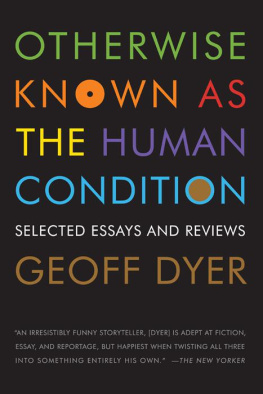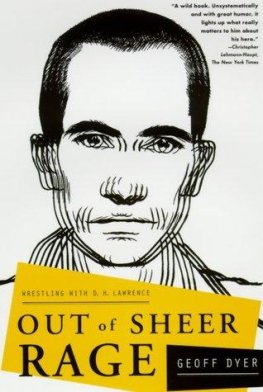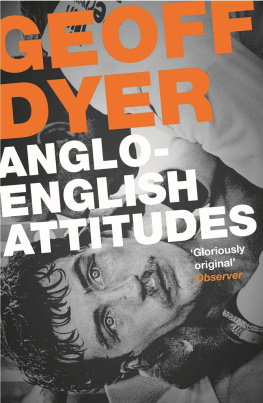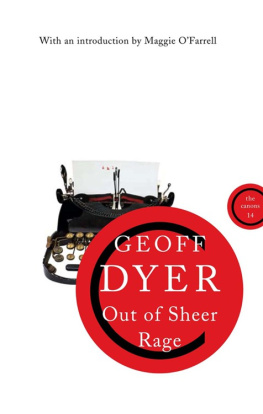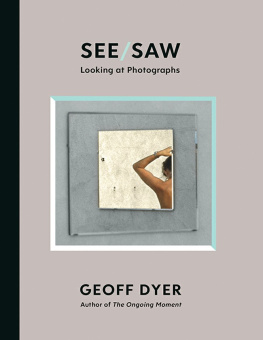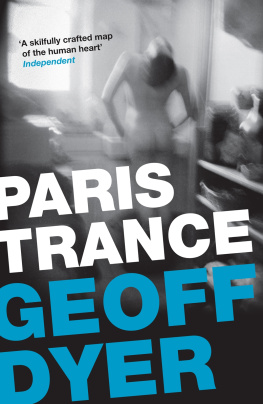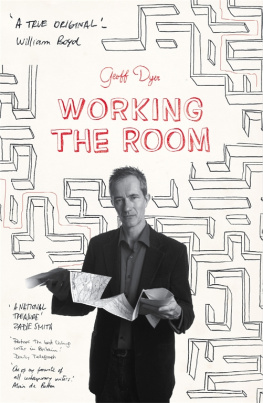OTHERWISE
KNOWN AS
THE HUMAN
CONDITION

Also by Geoff Dyer
Working the Room: Essays 19992010
Jeff in Venice, Death in Varanasi
The Ongoing Moment
Yoga for People Who Cant Be Bothered to Do It
Anglo-English Attitudes: Essays, Reviews, Misadventures 198499
Paris Trance A Romance
Out of Sheer Rage
The Missing of the Somme
The Search
But Beautiful
The Colour of Memory
Ways of Telling: The Work of John Berger
OTHERWISE
KNOWN AS
THE HUMAN
CONDITION
Selected Essays and Reiviews
1989-2010
Geoff Dyer
Graywolf Press
Copyright 2011 by Geoff Dyer
Excerpt from The Funeral of New York by Adonis, translated by Samuel Hazo, from The Pages of Day and Night
(Evanston: Marlboro Press/Northwestern University Press, 1994).
This publication is made possible by funding provided in part by a grant from the Minnesota State Arts Board, through an appropriation by the Minnesota State Legislature, a grant from the National Endowment for the Arts, and private funders. Significant support has also been provided by Target; the McKnight Foundation; and other generous contributions from foundations, corporations, and individuals. To these organizations and individuals we offer our heartfelt thanks.

Published by Graywolf Press
250 Third Avenue North, Suite 600
Minneapolis, Minnesota 55401
All rights reserved.
www.graywolfpress.org
Published in the United States of America
ISBN 978-1-55597-579-1
Ebook ISBN 978-1-55597-026-0
2 4 6 8 9 7 5 3 1
First Graywolf Printing, 2011
Library of Congress Control Number: 2010937517
Cover design: Kapo Ng @ A-Men Project
for Ethan Nosowsky
Contents
Illustrations
Jacques Henri Lartigue: Cap dAntibes, August 1953. Ministre de la Culture, France / AAJHL.
Robert Capa: Near Nicosia, Sicily July 1928, 1943 (Magnum)
Ruth Orkin: V-E Day, Times Square, NYC, 1945. Courtesy of Ruth Orkin Photo Archive.
Unknown photographer: Celebrants in Times Square on V-E Day (Corbis)
Richard Avedon: W. H. Auden, Poet, St. Marks Place, New York, March 3, 1960. 2010 The Richard Avedon Foundation.
Enrique Metinides: Mexico City, 1972. Courtesy of Thomas Dane / Riding House.
Joel Sternfeld: Ruins of Drop City, Trinidad, Colorado, August 1995. Courtesy of the artist and Luhring Augustine, New York.
William Gedney: Eastern Kentucky, 1972. William Gedney Collection, Duke University Rare Book, Manuscript, and Special Collections Library.
William Gedney: Diane Arbus William Gedney Collection, Duke University Rare Book, Manuscript, and Special Collections Library.
William Gedney: Eastern Kentucky, 1966 William Gedney Collection, Duke University Rare Book, Manuscript, and Special Collections Library.
Michael Ackerman: Untitled, from the series and book Fiction . By kind permission of the photographer.
Miroslav Tich: Untitled. Private collection, copyright Miroslav Tich.
Todd Hido: from the series Motel Club. Black-and-white reproduction of original color photo. By kind permission of Todd Hido.
Idris Khan: The Uncanny, 2006 (70 x 80 inches, Lightjet Print). Courtesy of Idris Khan, Victoria Miro Gallery, London, and Yvon Lambert Gallery, New York.
J. M. W. Turner: Figures in a Building, circa 183035. Tate, London, 2010.
Jennifer Gough-Cooper: Danaid from Apropos Rodin, Thames & Hudson, London, 2006. By kind permission of the photographer.
Chris Smith: Barry McGuigan: Las Vegas 1986 (Hulton Archive / Getty Images)
Antonello da Messina: Ecce Homo (detail) (Bridgeman Art Library)
Gentile Bellini: St. Mark and St. Nicholas, Piet (detail) (akg-images / Cameraphoto)
Robert Hall: Ghost Bike, New York, 2008. Robert Hall.
The Triumph of Saint Ignatius (detail), 1694 (Alinari / Art Resource, New York)
On the Roof: Authors collection
OTHERWISE
KNOWN AS
THE HUMAN
CONDITION
Introduction
When writers have achieved a certain reputation they are sometimes prevailed upon to publish their occasional pieces (i.e., their journalism). The author agrees, reluctantly, modestlyMartin Amis offered his first collection, The Moronic Inferno, with all generic humility because this kind of put-together is considered a pretty low form of book, barely a book at all.
My own caseand my own opinion of such collectionsis a little different. Almost as soon as I began writing for magazines and newspapers, I hoped one day to see my articles published in book form. I especially wanted to publish such a book because I virtually never read newspapers or magazines. If I see a piece by a writer I admire in a paper I very rarely read it; but as I skim through catalogs of forthcoming books, the ones that catch my eye are collections of exactly those pieces that I had neglected to read in their original context. Since I prefer to read other peoples journalism in book form, it was not just vanity that made me want to see my own presented that way too. When I first broached the possibility with my editor in the UK, in the late 1990s, he asked if these pieces would be linked, if there might be some way of passing off these bits and bobs as a coherent book organized around a defining theme. Would it be possible, for example, to compile a book of my writings about photography? Or American writers?
Possible, yes, but, from my point of view, not at all desirable because it was, precisely, the unruly range of my concerns that I was keen to see represented in a single volume. I wanted the bookpublished in 1999 as Anglo-English Attitudes to serve as proof of just how thoroughly my career (though I should add immediately that writing, for me, has always been a way of not having a career) had avoided any focus, specialization, or continuity except that dictated by my desire to write about whatever I happened to be inter ested in at any given moment.
It seemed to me that this variegation might even give the collection a kind of unity or coherence. The more varied the pieces, I argued, the more obviously they needed to be seen together as the work of one personbecause the only thing they had in common was that they were by that person. If there was one thing I was proud of in my literary non-career it was the way that I had written so many different kinds of books; to assemble a collection of articles would be further proof of just how wayward my interests were. Such a collection would also show that I had remained faithful to the example of my mentor, John Berger. In Ways of Telling, my dull little book about him, I claimed that Bergers ability to write on so many different subjects in so many different ways was an indication not only of his ability but also of his success as a writer; over the years this was exactly the kind of success, the kind of freedom, I tried to carve out for myself. Introducing his collection of articles on French writers and thinkers, The Word from Paris, John Sturrock counsels that literary journalists would do well professionally to have a territory that is known to be theirs, and not to lay claim to a diffuse expertise qualifying them to write about anyone or anything. If Sturrocks rightand he almost certainly isthen I feel very fortunate to have remained conspicuously in the wrong for so long.
A distinction is often made between writers own workwhich they do for themselvesand the stuff they do for money. The ideal, in this scenario, is to be able to devote all your time to your own writing. Again, my case is rather different. Most of the journalism I do is as much my own writing as, well, my own writing. Whereas Amis talks about writing his Moronic Inferno pieces left-handed, tailoring them for the particular audience of whichever publication had commissioned him, the pieces in this volume were all written right-handed (metaphorically speaking, since I am naturally lefthanded). That is to say, I have always written without any regard for the presumed audience of a given publication. Subject or mood always dictated the form and style of these pieces, not the publications for which they were intended. Often they werent intended for anywhere; I wrote them and sent them offon spec, as they saylike short stories, hoping someone, eventually, would take them.
Next page
